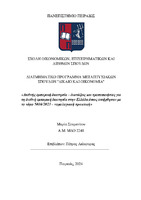Διεθνής εμπορική διαιτησία – διατάξεις και τροποποιήσεις για τη διεθνή εμπορική διαιτησία στην Ελλάδα όπως εισήχθησαν με το νόμο 5016/2023 – νομολογιακή πρακτική

View/
Keywords
Διεθνής εμπορική διαιτησία ; Νόμος 5016/2023 ; International commercial arbitration ; Νέος νόμος στη διαιτησία ; UNCITRALAbstract
In this thesis, the institution of International Commercial Arbitration in Greece is examined as an alternative dispute resolution method, which is gaining increasing importance due to the inefficiencies of the Greek judicial system, particularly the prolonged delays in issuing court decisions. International commercial arbitration serves as a crucial tool for businesses, offering a fast and flexible means of resolving cross-border commercial disputes, thereby reducing the risks and obstacles associated with traditional judicial proceedings. This makes Greece more attractive to international investors and enhances its competitiveness in the global market while simultaneously strengthening business confidence in Greece as an international investment destination. This study analyzes the weaknesses of the existing legal framework governing arbitration in Greece, focusing on the shortcomings and gaps in Law 2735/1999. Although this law represented the first comprehensive effort to regulate international commercial arbitration in the country, it contains provisions that fail to meet the modern demands of the business community, such as inadequate regulations regarding arbitration procedures and the enforcement of arbitral awards. In this context, the significant improvements introduced by the new Law 5016/2023 are examined. This law was enacted to address the legislative gaps of its predecessor, introducing innovative provisions that align Greek legislation with international best practices.
Among the innovations of the new law are regulations that enhance the transparency and independence of arbitrators, the ability of parties to choose their preferred procedure, and improved mechanisms for enforcing arbitral awards. Furthermore, the new law provides a more flexible framework for the selection and function of arbitrators, ensuring higher-quality services and greater adaptability for businesses. This study aims to highlight the importance of international commercial arbitration as an essential tool for promoting international business activity in Greece. It explores the opportunities presented by the new law, the prospects it creates for Greek businesses and investors, and the future challenges of integrating arbitration as an integral part of the Greek business and legal environment. Additionally, the flexibility of the new law in incorporating modern technologies and artificial intelligence into arbitration is analyzed as one of its most significant innovations. Ultimately, the study concludes that these reforms will strengthen Greece’s position on the global economic map by examining the new opportunities available to businesses operating in Greece.


